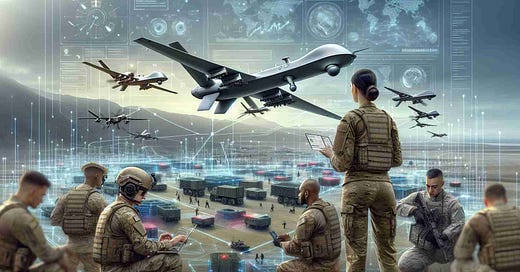On 18 April, China submitted a Position Paper on the Military Applications of Artificial Intelligence to the UN Secretary-General, in response to UN General Assembly Resolution 79/239 on the military applications of AI.
In this paper, China reaffirms the core principles it outlined in the Global AI Governance Initiative, while emphasizing that:
"China believes the military application of AI should be evaluated objectively, recognizing both its potential value and inherent risks. It is vital to guide military AI in the right direction while guarding against unregulated development. "
China’s Position Paper on the Military Applications of Artificial Intelligence
Submitted pursuant to UNGA Resolution 79/239 (2024)
The rapid development and wide applications of artificial intelligence (AI) technology in the military domain has reshaped future combat paradigms, while presenting potential challenges to international peace and security. In the context of the world facing diverse challenges to peace and security, all parties should strive to seek consensus through dialogue and cooperation on the regulation of AI in military domain, promote the development of an open, fair and efficient governance framework of AI security, minimize risks and ensure that AI technologies remain secure, reliable, and controllable, and always develops in a way that is beneficial to human civilization.
China has always been constructively engaged in the global governance of military applications of AI in a responsible manner. We advocate adhering to a “people-centered approach in military applications of AI”, upholding the vision of common, comprehensive, cooperative and sustainable security, in a bid to build a community with a shared future for mankind. In 2021, China submitted to the The Convention on Certain Conventional Weapons a position paper on Regulating Military Applications of AI, which proposes systematic perspectives and recommendations on responsible development and use of AI in military domain in terms of strategic security, military policies, law and ethics, technological security, research and development, risk management and control, rules-making and international cooperation. In 2023, China proposed the Global AI Governance Initiative, calling on all countries, especially major countries, to adopt a prudent and responsible attitude to the research, development, and application of AI technologies in the military field. We would like to suggest the following:
First, a prudent and responsible approach should be taken. While enhancing their legitimate defense capabilities, all countries, especially those major countries, should refrain from seeking absolute military advantage through AI and undermining the legitimate security interests of others. Efforts should be made to avoid misunderstandings and miscalculations and prevent an arms race in this field.
Second, a people-centered approach should be upheld. It is essential to always regard human as the final subject of responsibility and ensure that relevant weapon systems must be under human control. Military applications of AI should respect and protect human dignity and human rights, and honor the common values of humanity.
Third, the basic principle of “AI for Good” should be observed. Applications of artificial intelligence (AI) technology in the military domain should contribute to maintaining peace, comply with international humanitarian law and other applicable international laws, and strive to reduce collateral casualties.
Fourth, agile governance should be implemented. We should strengthen forward-looking risk assessment and personnel training on AI, and take necessary risk mitigation measures and reduce proliferation risks , while not hindering innovation and peaceful uses of technologies.
Fifth, multilateralism should be upheld. We should support the United Nations in fulfilling its due role, welcome the development of inclusive platforms for discussion by all parties, and make efforts to establish governance frameworks based on broad participation and extensive consensus.
China believes that the significance of AI in the military domain should be objectively assessed. It is essential to guide the proper development direction of military AI while preventing unregulated growth. In the next phase, the international community should collaborate to maximize benefits while minimizing harms. China proposes the following ideas and suggestions:
First, establishing clear guidelines. Security and development must be given equal attention. It is imperative to abide by the purposes and principles of the UN Charter, observe the basic norms governing international relations, and ensure that AI technology will not become a tool for launching an invasion and pursuing hegemony. China is willing to engage in further exchanges with all parties on the concept of “a people-centered approach in military applications of AI” and build consensus continuously.
Second, improving governance measures. Based on the current state of AI development and application, we should promote the establishment of a testing and assessment system based on AI risk levels, implement agile governance and carry out tiered and categorized management for rapid and effective response. All countries should, based on their national conditions, establish and improve domestic legal and regulatory systems, refine relevant ethical guidelines, strengthen education and training, so as to enhance the safety, reliability, and controllability of AI technologies.
Third, strengthening international cooperation. All countries should adhere to the principles of openness and inclusiveness, engage in dialogue and exchange to enhance mutual understanding,and enhance policy coordination and capacity-building cooperation regarding AI governance to continuously elevate governance levels.
The piece has been modified to reflect the official ENG version of the doc.




